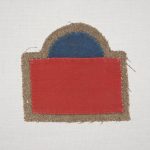Private Raymond Duval, MM, was a soldier of the 14th Battalion (Royal Montreal Regiment) CEF who served overseas during the last two years of the First World War. He participated in some of the fiercest fighting seen by Canadians during the war and was decorated for bravery at Passchendaele. Determined to preserve his memories of the First World War, he maintained a daily record of his experiences. Here is what he wrote precisely 100 years ago today:
Friday August 31, 1917: Fell in at 11am and entrained for Etaples where we arrived at 2pm and am now back at this place again and it hasn’t changed much Missed seeing Norman Catto who went thro’ this morning How I dread going back up to that line no one knows. Got up 5.30 and had best breakfast since coming to France Got equipment and pay a hair cut shave and shampoo.
Author’s note in 1954: Following first aid attention at the Field Dressing Station, which was located close to support lines, I was taken by ambulance to Bethune (I believe that was the place) and placed on a hospital barge on the canal, and by this taken to St. Omer, and placed in #59 Hospital. The trip by barge was a most pleasant event, which lives to this day [in my memory] as extremely pleasant.
My wound was not painful or troublesome in any way, so I enjoyed the voyage to the full. As I lay in bed, I could easily see the countryside. The beautiful fields and farms bathed in August sunshine in their peaceful sereneness were a welcome sight after the carnage and horror of the battlefront.
When I was placed on the Hospital barge being a head-wound case, I was hauled most tenderly and immediately put in bed where I immediately went into a sound sleep. Waking up some time later [I] was amused to see a nursing sister looking at me with a very broad smile. On my enquiry, “why the amusement?” she said, “You ought to see yourself, bandaged like an Indian and covered with mud!” I surely was a mess, but feeling so good and comfortable, I heartily joined in a good laugh.
My wound proved to be a very light one, as it was found that I had only sustained removal of a piece of my scalp, but as the M.O. [Medical Officer] was somewhat doubtful, I was temporarily slated for removal to England. In the meantime, I was allowed to get up and wander around the ward, and I had some interesting talks with men from various units of the British Army. Some of these men had been in fighting in almost every war theatre. Some of those boys were really magnificent in their nonchalance. It was a revelation to me to see how casual they seemed when discussing their experiences.
My days, like those of the other boys in the same condition, were passed very pleasantly. We went for walks in the park and town. The few days in St. Omer were pleasant, but the lack of mail and old acquaintances soon made me lonesome, and I longed to get back to the Regiment, but the M.O. would have none of that. So in company with a number of the other patients, I was issued a new uniform and sent to Boulogne and assigned to Convalescent Camp No. 7, located close to the shore overlooking the English Channel. This was an immense camp, all kinds of men from all branches of the services, even some Americans. Our home was one of hundreds of large tents or marquees, which each contained 25 beds.
This was very comfortable and the August weather was very pleasant under these conditions, but here again I found myself getting lonesome for the boys up front, and kept trying to get away. However, army routine had to be followed.
I was assigned to a marquee full of Australians, or should I say all but two of us, a New Zealander and myself, and we found ourselves to be more congenial to each [other] than with the Aussies. He was a charming boy, and we spent many happy hours together describing our respective homes. I should state here that the Australians were a fine bunch of men, big row-boned, carefree, and seemingly always happy and gay.
We now started to harden up, with routine drill, parades, route marches, etc. At this time, I had been away from the front line some 10 days and as my mail had not caught up yet, I worried about my wife, how much she knew, [and] also my mother. I wondered if, when, and how they had been advised. I wondered if I had been reported severely wounded, killed, missing, or what. So [I] watched for each mail very anxiously. The time dragged along with parades, medical inspections, etc. Some two weeks after reaching this camp, a terrific gale blew up from the channel, and when we woke up (or at least got up) and looked out over the camp, it was a mess. As far as the eye could see, not a tent was left standing. All were flat down, and men in every direction were struggling to get them up. Ours was the only one left standing, and we were very happy about that.
I was now transferred to Base Details Camp in the same area, and was put on all sorts of jobs: helping in the kitchen, scrubbing floors, etc., etc. However, like the other boys, I was happy about that [since it meant] we were busy. On August 31st, I entrained for the big camp at Etaples, the same I had come to some 3 months earlier. On arrival, we were paid, and were surely glad of that, as I had been flat broke for some time.
Search the glossary here for definitions




